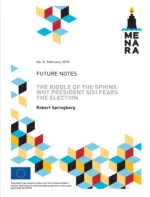The Riddle of the Sphinx: Why President Sisi Fears the Election

MENARA Future Notes, nº. 8
Egypt’s President Sisi has been described as Sphinx-like, carefully hiding his thoughts and intentions behind a stoical exterior. His utterances tend to be moralistic, more like an austere father lecturing, even threatening errant children, than a politician engaging in political debate and laying out programmes. When he does address the latter it typically takes the form of eulogizing specific projects with which he has associated himself and charged the military with executing. In the lead up to the presidential election of late March, the general riddle of this Sphinx-like President has taken on more specific form. On the one hand, the drumbeat of reports of economic, counter-terrorism and foreign policy successes emanating from the presidency and other government officials has dramatically increased. A steady stream of announcements is informing Egyptians that the economy is taking off, that terrorists are being subdued, and that Egypt is playing an ever-greater role regionally, even globally. On the other hand, the behaviour of the President-Sphinx increasingly reflects that of a leader who feels profoundly threatened by political forces, including those closest to him. The riddle then is if indeed the regime is performing so well, why does its leader feel so insecure? One answer might be that the insecurity is due primarily if not exclusively to the threat posed to the country and its leader by Islamist terrorists. President Sisi misses no opportunity to lecture domestic and foreign audiences on this issue. In January he publicly ordered his military and security officials to defeat the long-running insurgency in the Sinai in three months. In February, 292 suspects faced trial in a military court on charges of trying to assassinate Sisi and King Salman of Saudi Arabia. Also in that month it was reported by The New York Times that the Israeli air force had been requested by Egypt to assist its counter-terrorism campaign in Northern Sinai. The stream of accusations and trials of Muslim Brothers for terrorism related offences that commenced in the wake of the July 2013 coup, has not abated.
Keywords: Authoritarianism; Egypt; Presidencial Elections; Terrorism